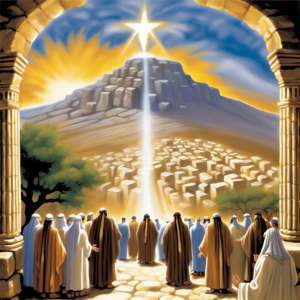The Dichotomy of Blessings and Curses: Understanding the Dual Mountains in Scriptural Context


In the realm of spiritual life and holiness, a foundational pillar of belief lies in the binary understanding of blessings and curses that are often illustrated vividly through the Hebrew Scriptures. Yehovah has conveyed His divine principles through His chosen people, using the imagery of two mountains: Mount Gerizim, the Mount of Blessings, and Mount Ebal, the Mount of Curses. These mountains represent the dual paths that one can follow in obedience or disobedience to the commandments provided by Yehovah. Let us delve deeper into this profound concept by referring to specific scriptural references.
Mount Gerizim: The Mount of Blessings
Within the framework of the Torah, Mount Gerizim is revered as a beacon of blessings that Yehovah bestows upon those who faithfully adhere to His commandments. In Deuteronomy 28:1-14, the scripture elucidates the blessings of diligently hearkening unto the voice of Yehovah, to observe and do all His commandments.
- Prosperity and Abundance
- “Yehovah shall open unto thee his good treasure, the heaven to give the rain unto thy land in his season, and to bless all the work of thine hand…” (Deuteronomy 28:12)
- Protection
- “Yehovah shall cause thine enemies that rise up against thee to be smitten before thy face…” (Deuteronomy 28:7)
- Health and Well-being
- “And Yehovah will take away from thee all sickness…” (Deuteronomy 7:15)
Mount Ebal: The Mount of Curses
Conversely, Mount Ebal stands as a stark representation of the consequences of diverging from the path laid out by Yehovah’s commandments. Deuteronomy 28:15-68, a longer passage compared to that of the blessings, outlines the curses that fall upon those who disobey Yehovah.
- Poverty and Scarcity
- “Cursed shalt thou be in the city, and cursed shalt thou be in the field. Cursed shall be thy basket and thy store…” (Deuteronomy 28:16-17)
- Sickness and Diseases
- “Yehovah will smite thee with the botch of Egypt, and with the emerods, and with the scab, and with the itch, whereof thou canst not be healed.” (Deuteronomy 28:27)
- Exile and Disgrace
- “And Yehovah shall scatter thee among all people, from the one end of the earth even unto the other…” (Deuteronomy 28:64)
The Theological Implication of the Dual Mountains
While the immediate context of these scriptures refers to the nation of Israel, many within the Hebrew Roots movement understand them to have lasting implications for individuals and communities dedicated to following Yehovah’s teachings today. It forms a sacred dichotomy, a choice between blessings and curses, obedience and disobedience, life and death.
The Ultimate Choice: Between Blessings and Curses
Joshua, the servant of Yehovah and successor of Moses, reaffirmed the deep-seated commitment to Yehovah’s commandments by presenting the Israelites with a choice. A choice that reverberates throughout generations, echoing in the hearts of the faithful even today.
- Reverence to Yehovah
- “And if it seem evil unto you to serve Yehovah, choose you this day whom ye will serve…” (Joshua 24:15)
- Commitment to Righteousness
- “Only fear Yehovah, and serve him in truth with all your heart: for consider how great things he hath done for you.” (1 Samuel 12:24)
The implications of choosing obedience to Yehovah are profound, not just assuring material and physical well-being, but aligning oneself with the righteous and holy path that leads to eternal life. In contrast, disobedience leads to a path of despair, destruction, and ultimately death.
Conclusion
Mount Gerizim and Mount Ebal stand as immutable testaments to Yehovah’s principles of justice, delineating the paths of blessings and curses based on obedience and disobedience to His commandments.
In the intricate tapestry of spiritual journeying, understanding the dichotomy of blessings and curses serves as a navigational tool to align oneself with the teachings and principles bestowed by Yehovah through His scriptures. Every individual stands at the crossroads of choosing between Mount Gerizim and Mount Ebal, between blessings and curses, with the scriptures serving as a guiding light to make a choice rooted in faith, reverence, and obedience to Yehovah.
In our contemporary society, where moral relativism often blurs the lines between right and wrong, the teachings anchored in the scriptures surrounding the mounts of blessings and curses serve as a beacon of light guiding us towards the path of righteousness.
As we meditate on these principles, let us constantly strive to walk in the path of obedience to Yehovah’s commandments, to attain the blessings promised at Mount Gerizim, steering clear of the curses that await at Mount Ebal. It is a continuous journey of spiritual discipline, moral fortitude, and unyielding faith in Yehovah’s word. May we all choose wisely, with hearts anchored firmly in the teachings of Yeshua, who epitomized obedience and righteousness, guiding us towards the mount of blessings.

